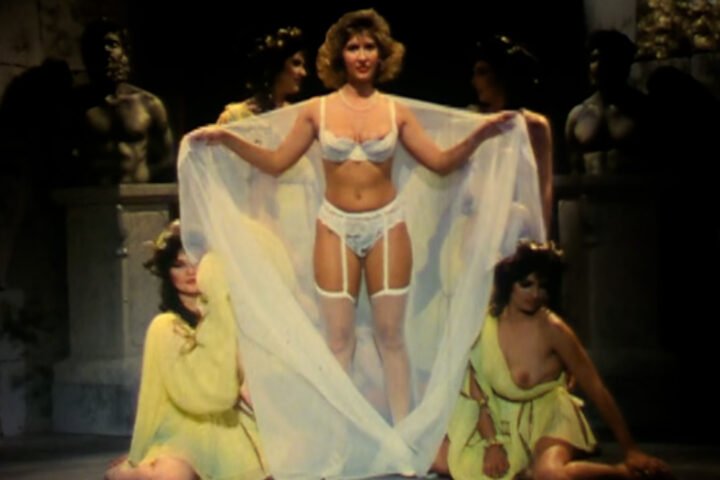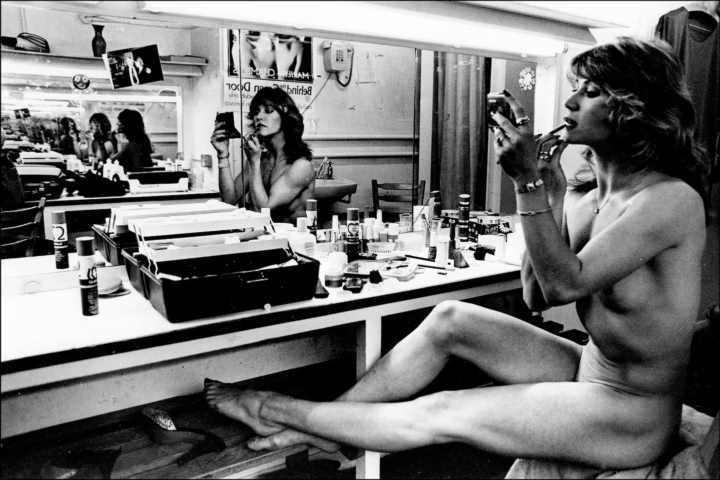In the quiet, well-manicured cul-de-sacs of suburban America, behind white fences and polite dinner parties, two women lived lives wrapped in routine—and starved of joy. Tracey Jo Whitman and Elizabeth were housewives, mothers, and good girls by design. But inside, they were aching. Not for chaos or scandal, but for something real. Something wild. Something that made their hearts beat again.
Tracey Jo (played with aching precision by Dyanna Lauren) wore her boredom like a second skin. Her daily act of rebellion? Stealing cookies at the supermarket—small, sugary betrayals against a life that offered her little else. Elizabeth (Melissa Hill, devastating and raw) wasn’t much better off. Her husband was a serial cheat, her affections unreciprocated. Together, they floated through life like ghosts with wedding rings.
Then came Roy.
He wasn’t supposed to matter. Just a grocery store bagger with haunting eyes and a smirk that saw right through them. But when Roy (Steven St. Croix, enigmatic and unforgettable) caught Tracey Jo stealing snacks, something snapped—and something began.

From that moment, Roy became more than a man. He was a presence. A whisper in their ears. A disruption in the rhythm of repression. With each encounter, each flirtation, he peeled back the layers they’d spent years building. What started as embarrassment became obsession. What began as resistance turned to surrender.
Roy seduced them not just with touch, but with truth. He saw what their husbands didn’t: the longing, the fury, the spark. And he fanned it until it burned.
Tracey Jo, once meek and hesitant, transformed into a woman who chose desire over duty. In her scenes, Dyanna Lauren didn’t just perform—she evolved. She moaned with purpose, moved with intention, and showed a woman reborn through her own audacity. Her sex was not submission—it was reclamation.
Elizabeth’s descent was darker, heavier. Her pain wasn’t cured by lust—it was intensified by it. Melissa Hill captured every flicker of heartbreak and heat with unsettling realism. The moment she confronted her husband with a shotgun wasn’t just revenge—it was her scream for agency. For recognition. For freedom.

And through it all, Roy watched. Changed. Grew darker. The white uniform gave way to black. The lighting around him grew redder, hotter—until he no longer felt human at all. Was he a devil? A fantasy? A force of nature? Director Paul Thomas never answers, but his camera suggests it all. Every shadow, every color shift, every glance—nothing is accidental. In his hands, this isn’t just porn. It’s cinema. It’s story.
The eroticism in Bad Wives isn’t filler—it’s fuel. Every sex scene marks transformation. Every climax is a crack in the facade. The suburban setting—a symbol of order—slowly dissolves into chaos, into revelation. The husbands, once silent figures of authority, become irrelevant. Power shifts. The wives awaken.
This is a film that dares to treat its women not as objects but as journeys. Their infidelity isn’t framed as a scandal—it’s survival. Their orgasms are not ends—they’re beginnings. The sex is passionate, graphic, and often primal, but always purposeful.
And yet, Bad Wives is not without its flaws. Some DVD versions chop it into incoherence. Its pacing can be slow for viewers hungry only for instant gratification. And Roy’s surreal presence may confuse those expecting a straightforward plot.
But for those who stay, who watch, who feel—it rewards.
Title: Bad Wives
Release Year: 1997
Director: Paul Thomas
Screenwriter: Dean Nash
Studio: Vivid Entertainment Group
Runtime: Approximately 150 minutes (original version), approximately 74 minutes (DVD edit)
Language: English
Main Cast: Dyanna Lauren, Melissa Hill, Steven St. Croix, Jon Dough, Tony Tedeschi, Stephanie Swift, Tricia Devereaux
Awards:
- AVN Award for Best Film
- AVN Best Actor (Steven St. Croix)
- AVN Best Actress (Dyanna Lauren)
- XRCO Award for Best Film
- XRCO Award for Best Screenplay
- AVN Award for Best Anal Sex Scene

This is not a film for everyone. It’s for the curious. The contemplative. The couples exploring the edge. The lovers of narrative erotica. It’s for viewers who believe porn can say something and Bad Wives does. It screams.
Years later, Bad Wives still lingers in adult film history as a masterpiece of meaning and moaning. It won awards not just for its sex—but for its soul. It showed that beneath the sheets of suburbia lies a story worth telling. A fire waiting to be lit.
And sometimes, all it takes… is a devil in aisle three.
Who should watch “Bad Wives (1997)”
f you’re someone who enjoys adult films with real storylines, complex characters, and a touch of psychological depth, Bad Wives is worth your time. This isn’t your typical quick-fix adult movie—it’s layered, bold, and unapologetically erotic.
It’s perfect for viewers or couples exploring fantasies around hotwives, cheating, sexual empowerment, and that age-old temptation of the mysterious stranger who sees what others don’t. The film leans into the thrill of forbidden encounters, the unraveling of domestic perfection, and the quiet power of women choosing their own pleasure.
Whether you’re into slow-burn seduction, emotionally charged sex scenes, or simply want something with substance behind the heat—Bad Wives blends all of that with cinematic flair. It’s for those who want their erotica with feeling, tension, and just the right amount of danger.



